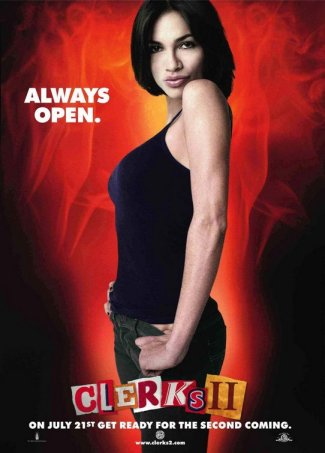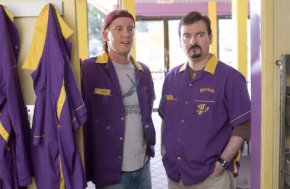|
Clerks
II
Kevin Smith’s debut film, Clerks, may have
been crude and juvenile, but it had a point. Peering into
the lackluster lives of two clerks content with residing
at the bottom of the economic food chain had a certain erudite
charm to it. They may have been stuck in a dead end pit,
but it was their dead end pit and they ruled the roost,
so to speak.
Smith’s
film intertwined popular culture with philosophical ponderings
with a tinge of intellectualism sprinkled in for good measure.
Whether Smith intended to or not, his film transcended its
vulgarity, working on an artistic level by contrasting Dante
Hicks (Brian O’Halloran) and Randal Grave’s
(Jeff Anderson) lack of motivation with social and class
skewering. Clerks suggested that a steady pop-diet
could also be a contributor to professional and personal
woes – a message that resonated with an entire generation
of slackers.
Clerks
II reignites the message by taking a look at Dante
and Randal ten years later, only to find them still jockeying
registers and spewing filth at every turn. Anyone who has
read press on the film or seen the trailer should be familiar
with the premise. The Quick Stop and RST Video strip mall
is burnt to a crisp, forcing the pair of clerks to find
new jobs at a fast food joint named Mooby’s.
The
premise is inspired and ultimately pays off in the end,
but like the original, you almost have to sit through the
entire film to appreciate where the director was headed
in the first place. Unlike the first film, Clerks II
feels like it leaves a little bit of the puzzle unexplored.
After
the fire, Dante and Randal tough out the job change for
a year before Dante finds himself engaged to Emma (Jennifer
Schwalbach) and poised to drop everything “Jersey”
by moving to Florida to manage a carwash bequeathed to him
by his new bride’s father. This is where we pick up
with the duo, on Dante’s last day of work at Mooby’s.
To complicate
things, Dante’s close relationship with his manager
Becky (Rosario Dawson) suggests that our hero may be caught
in yet another romantic entanglement. More on that in a
moment.
Randal,
on the other hand, appears to be angrier than ever. His
disdain towards customers in the first film felt so real
and so natural that one could nearly expect to find Mr.
Graves working at a local video store. The performance was
inspired, and it felt as though both Jeff Anderson and Brian
O’Halloran had been working those jobs for a few years
to prepare for the roles. The fact that Dante and Randal
feel a touch out of place at Mooby’s may stem from
Mr. Smith’s lack of experience working in the fast
food industry.
Either
way, the move to fast food makes sense, and even calls into
question which fate is worse, being stuck in the strip mall
hell of the Quick Stop and RST, or being resigned to thankless
and menial tasks for the benefit of a large corporate entity?
Maybe the same theme could have been explored with the pair
winding up at Big Choice Video.
When
their coworker Elias (Trevor Fehrman) finally shows up,
things start to take shape. Elias is a young, dedicated
Christian who loves the Transformers and The Lord of the
Rings trilogy. More importantly, Elias riles Randal like
no other, and the poor boy is quickly recognized as the
whipping boy of the lot, being subjected to excessive, if
funny, tormenting at every turn.
Why
does Randal despise Elias? What does Elias represent to
him that causes such vile treatment? The questions are posed,
and they are poignant if you dig deeper and draw your own
conclusions, but the film never fully explores this theme
completely. Or at least it feels that way upon initial viewing.
Like
the first installment, there is a good chance that this
sequel may benefit from repeat viewings. At first some plot
devices feel like far to similar to the original film, chiefly
the use of the romantic triangle, a rooftop interlude during
work hours, and a high school acquaintance that somehow
manages to stir the pot with their mere presence to name
a few. However, once the third act gets cranking, the re-use
of these themes becomes less of a negative and more so a
statement in theme.
In fact,
the third act is so meaty and resonate that one can’t
help but feel as though more of this sort of conflict earlier
on could have benefited the theme altogether. Cryptic? That’s
because I’m trying not to ruin the resolution.
Unlike
many sequels, Clerks II manages to compliment the
original while adding a layer to the arc that feels not
only justified in the end, but fulfilling as well.
Rating:

|







